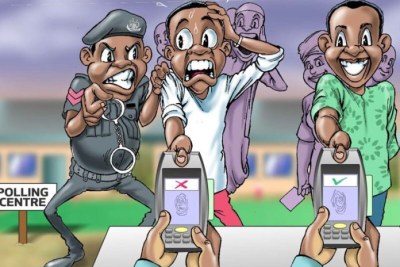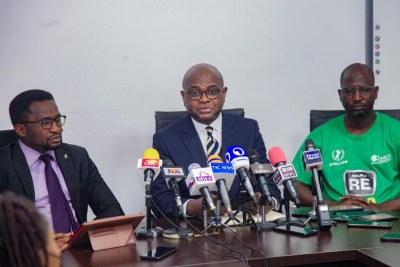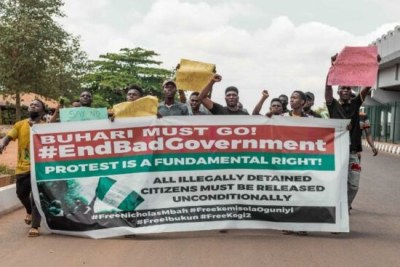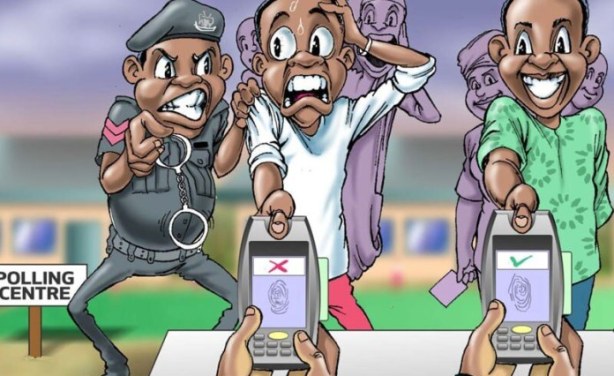-
Nigeria: A Public Health Approach to Ending Election Violence in Nigeria
allAfrica, 17 August 2021
The next general election in Nigeria to elect the President, Vice-President, Senators and members of the federal House of Representatives is scheduled for February 23, 2023.… Read more »
-
Nigeria: Nigeria Has Democracy but Not Development. How to Fix It
The Conversation Africa, 11 August 2021
After struggling for 39 years to develop a fertile ground for democratic governance, Nigeria had its turning point in May 1999 when it became the world's fourth largest democracy.… Read more »
-
Nigeria: Abdulsalami Warns Politicians, Says Defections Inducing Violence, Crisis
This Day, 9 July 2021
A former military Head of State, Gen. Abdulsalami Abubakar (rtd), yesterday cautioned against the frequent defections by politicians, saying it is causing violence, crisis that… Read more »
-
Nigeria: How Incessant Attacks Threaten 2023 Elections
Daily Trust, 23 May 2021
The chairman of the Independent National Electoral Commission (INEC), Professor Mahmood Yakubu, on Wednesday, said the series of attacks on the commission's facilities may… Read more »
-
Nigeria: 2023 May Not Be Feasible With Rising Conflicts, Insecurity in Nigeria, UK Warns
Vanguard, 9 July 2021
Ahead of the 2023 general elections in Nigeria, the British government has warned that the 2023 general elections in Nigeria may not hold due to rising cases of conflicts across… Read more »
-
Nigeria: NMA Speaks On Violence At Doctors' Elections in Enugu
Premium Times, 8 August 2020
The Nigerian Medical Association (NMA) has condemned reported violent clashes during the chairmanship election of the Enugu chapter of the association. Read more »
-
Africa: How Covid-19 Undermines Democracy in Africa
allAfrica, 18 July 2021
As the recorded number of infections in Africa edges towards the six million mark, it has become clear that Covid-19 is not only a public health challenge. Apart from the… Read more »
A Public Health Approach to Ending Election Violence in Nigeria
The next general elections in Nigeria to elect the President, Vice-President, Senators, and members of the federal House of Representatives are scheduled for February 23, 2023. Six months out, violent rhetoric is already escalating and the polity is heating up. Violence leading to deaths has marred previous elections in Nigeria, but it shouldn't anymore. We are advocating for a public health approach to organizing and conducting elections in Nigeria in order to keep people safe, says public health physician Ifeanyi M. Nsofora and clinician Salami Tijania
Violence during elections in Nigeria also leads to injury and displacement. In 2008, for instance, in the north-central Nigerian city of Jos, violence during local government elections led to more than 300 people being injured, 11,450 displaced and 60 deaths, according to reports by Nigerian Red Cross Society. In the 2019 general elections, an estimated 626 people were killed spanning over 6 months of electioneering campaigns before the general election as reported by Nigeria Civil Society Situation Room.
Nigerians should feel safe going to cast their votes for the candidates of their choice and go back home without dying in the process. Preventative public health advisories should be shared by the government before elections take place.
InFocus
-
The Senate has passed an Electoral Reform Bill aimed at improving transparency ahead of elections in 2023, but the opposition voiced reservations over how voting results should be ... Read more »
-
Over 70 civil society groups, the Situation Room, has released a report stating that the 2019 general elections did not meet the credibility threshold, based on the patterns of ... Read more »
-
"Our current crisis is the direct result of electoral decisions and leadership choices we have collectively made," writes Professor "to Kingsley Moghalu, a former deputy governor ... Read more »
-
Nigeria celebrates Democracy Day on June 12. This day was originally celebrated on March 29 but was changed by President Muhammadu Buhari, in commemoration of the June 12,1993 ... Read more »










